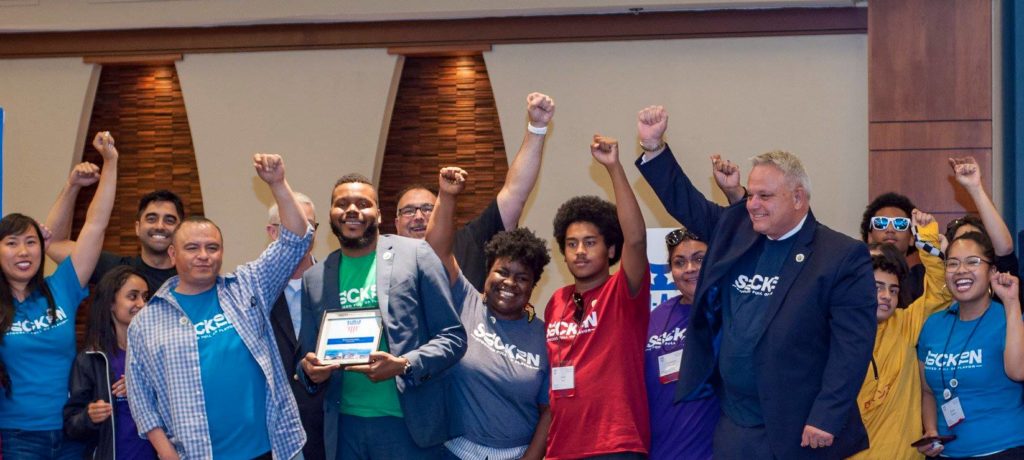Project at a Glance
- Issue Area Education and youth, Racial equity and healing
- Engagement Approaches Digital engagement, Racial healing, Youth Engagement
This content is available to members only. Members, please log in below to view! Not a member? Join us now to unlock this and other exceptional content.
Us History
Rationale
As a result of the trauma and neglect that has haunted Stockton, the city suffers from historical amnesia, and all too often it is the communities of color whose legacies, histories, and cultures are forgotten and marginalized. Downtown redevelopment and the building of the crosstown freeway in Stockton, throughout the 1960’s to 1970’s, destroyed the ethnic communities of Little Manila, Chinatown, Japantown, El Barrio Del Chivo, and historically Black neighborhoods. And no local educational institutions teach these local histories or the history of inequity, such as redlining, that explains why neighborhoods are the way they are today. Therefore, no local institutions explain the reasons for the environment a young person develops in; and we leave to chance the possibility of a young person to be a victim of that environment, apathetic to its issues, or an agent of positive change. How do we shift probability and intentionally create a generation of homegrown agents of positive change?
Project Summary
In 2016, the Little Manila Rising started the ethnic studies-based Us History after-school program at Edison High School in Stockton, California through the Sierra Health Foundation’s Leadership Development for Racial Equity grant. The tagline was: “Putting ‘us’ back into U.S. History.” The program met once a week through the 2016-2017 school year focused on Mexican American, African American, and Filipino American histories and cultures (the three largest ethnic groups on campus).
Through the year units included the Chicano Movement, Black Feminist Theory, the practice of redlining, the destruction of two local ethnic communities of El Barrio Del Chivo and Little Manila due to freeway development, issues facing the undocumented community, a know your rights workshop, the struggle for ethnic studies in Arizona, history of the Third World Liberation Front, Stockton history, a Dia De Los Muertos workshop, Asian American politics, the Black Lives Matter movement, and a presentation on public service from the Mayor of Stockton Michael Tubbs. Over the course of the school year, the program served 74 students with an average attendance of 16 students per week representing nine schools.
On April 11, 2017, the Stockton Unified School District Board of Trustees voted 7-0 in favor of adopting Ethnic Studies at all SUSD high schools as an elective.
Engagement Strategies
Outreach included paper flyers posted in classrooms and social media posts on Instagram, Twitter, and Facebook. But essential to launching the program was a field trip to San Francisco Unified School District (SFUSD) to visit their ethnic studies classes. In preparation for Us History, teachers organized a field trip to observe how SFUSD implemented ethnic studies as a Freshman requirement. This allowed students to understand what ethnic studies was and produce excitement among other students by word of mouth. Students attended the Stockton Unified School District Board of Trustees meeting to advocate for the class. They spoke about what Ethnic Studies meant to them and what it could mean for their community if it was part of their school’s curriculum.
Outcomes
Us History is now in its second year and the group is eager to implement the improvements from the lessons learned in year one.
- The addition of more educators to provide greater diversity in our programming.
- Acknowledging that students cannot attend every week due to other school events and activities such as sports and employment. Now each workshop will be self-contained. In the past we would address topics over the course of two to three workshops leaving students who did not attend regularly feeling out-of-the-loop.
- Inclusion of LGBT+ inclusive culture and issues awareness into our curriculum.
- Promotion of upcoming workshops through the Remind group texting service for our students.
- Implementation of better student evaluations through use of online forms.
Testimonials
“As a foster youth, I come from a really long personal history of not knowing. Well, Ethnic Studies has broadened my view of the world. It helped me establish who I am, my past, and who my ancestors were.”
“In Us History, we were more than educated. We were empowered by our legacy and the legacy of others… It is a privilege that my siblings, my colleagues, and teens, in general, should also have.”
“Here I am today speaking on behalf of my ethnic studies program, proud to say I am Celin, a prideful Asian American empowered with the knowledge that I have gained. Malcolm X once said, ‘If you don’t stand for something you will fall for anything…’ I learned to be a positive Stocktonian and to be proud of my roots. I learned the importance of community and why we should always take the opportunity of its improvement… When do you ever hear words like ‘miscegenation, diaspora, normalization, or colonization’ in your everyday history classes? Grant SUSD schools Ethnic Studies now!”
Timeline of Project: Since 2016
Initiator: Little Manila Rising
Additional Resources:
Recovering from Historical Amnesia
“I am”- Project Videos
Stockton, CA – 2018 AAC Winner: Presentation
Local Contact:
Dillon Delvo, Executive Director
Little Manila Rising
209-479-4187
info@littlemanila.org

Explore More Innovations From Communities Across the Country and Down the Road
See All ProjectsThank You to Our Key Partners




